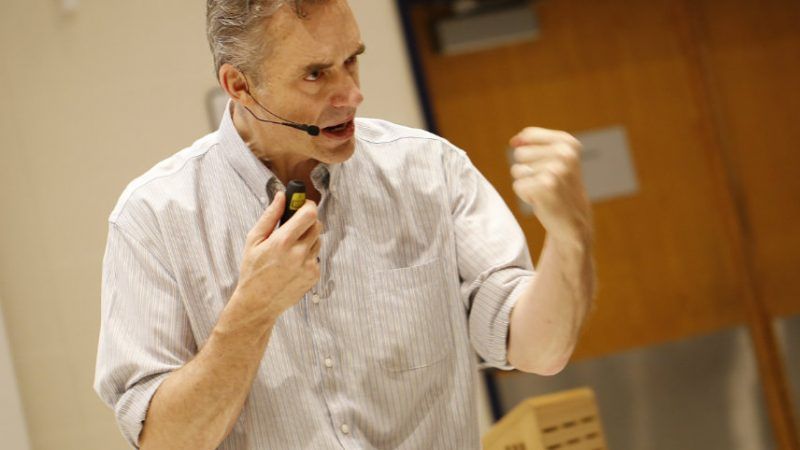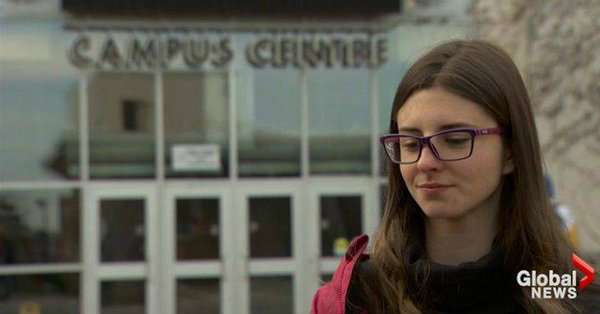Graduate Instructor Who Showed Gendered-Pronoun Debate to Class Is Basically Hitler, Says School
"It's dangerous to say that a topic is off the table just because it might be a little bit controversial," says the Wilfrid Laurier University student.


As Lindsey Shepherd was pleading her case before Wilfrid Laurier University faculty and staff, the 22-year-old Canadian grad student and teaching assistant seemed caught off guard by their demands. Her superiors weren't saying she couldn't show a televised debate over gender-neutral pronouns in the context of a classroom discussion on language—they just needed her to condemn one side of the debate first. To do otherwise, they said, was "like neutrally playing a speech by Hitler, or Milo Yiannopoulos."
Shepherd neither endorsed nor decried either side of the TV Ontario showdown between controversial University of Toronto psychology professor Jordan B. Peterson and Nicholas Matte, a professor in the Waterloo University women's studies department. In the clip that Shepherd played for first-year communications students, Matte and Peterson argue over whether it's appropriate for professors to address students by pronouns other than "he" and "she"—something Peterson refuses to do.
The clip was shown in the context of a class discussion on how language shapes culture and how gender-specific pronouns have caused controversy. "I was not taking sides," Shepherd—who does not agree with Peterson's position—would later tell school authorities. "I was presenting both arguments."
After an anonymous student complaint was filed, Shepherd was called into a meeting with her supervising professor Nathan Rambukkana, another communications school professor, and the university's manager of gendered violence prevention and support. They claimed that Shepherd was "transphobic" and that she needed to keep her "problematic" views out of the classroom. Shepherd pushed back, insisting that she didn't share in Peterson's pronoun point-of-view but thought it was important not to bring her own views into the discussion.
"This is basically like playing—not to do the thing where everything is compared to Hitler—but this is like neutrally playing a speech by Hitler, or Milo Yiannopoulos from Gamergate," Rambukkana said in the meeting. "This is the kind of thing that, departmentally, in terms of critical communications studies, and in terms of the course, of what we're trying to do, is diametrically opposed to everything we've been talking about in the lectures."
In a Monday interview with CTV News, Shepherd said she was told "that you can't debate something like this because it causes an unsafe or toxic learning environment. I ended up being called transphobic and someone who causes harm and violence." Going forward, she would have to file all lesson plans in advance and expect random drop-in reviews, the tribunal told her.
Shepherd said she was speaking out because situations and attitudes like these hurt the core mission of college education. "I think it's dangerous to say that a topic is off the table just because it might be a little bit controversial," she told CTV.
When Shepherd first went public with her story in early November, the Ontario-based university was both dismissive and defensive. In an initial statement, Wilfrid Laurier President Deborah MacLatchy said that "as a responsible employer," the university is "obligated to abide by government regulations, human rights legislation and our own university policies"; "to this end," it had hired a third party "to gather the facts of the situation and assess them in a deliberate, fair and respectful manner."
The bizarre statement went on to suggest there are some ideas that may be worth discussing, but can't because of bureaucracy.
"I believe that as a university community we need to have more conversations about how academic expression happens throughout our institution," wrote MacLatchy. But "to be focused and constructive, these conversations should take place outside of the specific contexts that, for good reason, are often constrained by privacy legislation, employer regulations, and other legal requirements."
Shepherd was not impressed. "This was an opportunity for the university to be like 'it's true, we should be able to have a debate, we're sorry it became an issue and we're happy to foster debate in the university environment," she told The Star. "Instead, they're being weird about it."
She accused the university of subtly censoring her, "because it's not like they're banning me from the classroom, but they have now recognized me as someone who maybe thinks a little too independently for their tastes, so they have to discipline me into thinking the way they want me to think and the way they want me to transmit their message to the students."
Instead, she leaked an audio recording of her meeting with the seniors staffers, which she had secretly recorded. The recording was first published online by Global News and drew swift condemnation of the school throughout Canada's chattering classes.
In listening to the recording, "it's evident that there's a fundamental disagreement between [Shepherd] and her three superiors over the role of a university lecturer," notes Uri Harris at Quillette:
This becomes obvious as Shepherd goes to great lengths to assure them that she didn't take sides for or against Peterson or Matte and presented the debate neutrally. In fact, it eventually emerges that she disagrees with Peterson. It's quite evident that she takes pride in the fact that she was able to set aside her personal feelings and present the discussion neutrally. That, to her, is a university lecturer's duty.
After the recording was made public, the university president said an apology to Shepherd was in order. "The conversation I heard does not reflect the values and practices to which Laurier aspires. I am sorry it occurred in the way that it did and I regret the impact it had on Lindsay Shepherd."
Rambukkana also apologized. "This entire occasion and hearing from so many with passionate views on this issue from across the political spectrum has made me seriously rethink some of the positions I took in the meeting," he said.
Moral of the story: A university must be repeatedly publicly shamed, internationally, in order to apologize (oh, but keep the task force & investigation). Even then, ambiguous about free speech. Also, make sure to secretly record all meetings or they won't take you seriously.
— Lindsay Shepherd (@NewWorldHominin) November 21, 2017


Show Comments (172)